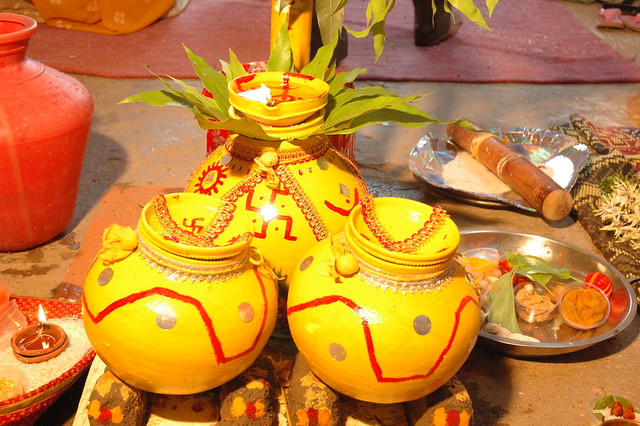An acquaintance of mine is now in the process of having her marriage arranged. She meets a new prospective groom every other day (and becomes ever so rich in the Hilarious Life Experience department).We were recently chitchatting about one such experience she had a few days back. She seemed really annoyed with the way the guy and his family treated her in their first (and understandably, only) meeting. Apparently they said they’d like it if she discontinued working after marriage, acted rude all along and to top it all – the guy’s mother took her to the kitchen where she had to demonstrate her cooking skills by preparing a few dishes of her choice under her probing gaze.
“But wasn’t that expected?” I wondered aloud. I’m not sure whether it was my reaction or the groom’s family’s actions which outraged her more.
“What do you mean?” She exclaimed.
“Well, you’ve chosen to have an arranged marriage. We all know that the bride/groom selection within the settings of an arranged marriage is a process which has been traditionally disparaging of women. It’s a patent fact that it is still thought of by most Indians – like this guy you unfortunately met – as the man’s privilege to pick and choose the women he’s presented with. If you wanted to be treated with the respect and equality you deserve, shouldn’t you have chosen the more natural way of getting married instead?”
“What do you mean??”
 Photo by Praveen_Verma
Photo by Praveen_VermaI realized the short version of my views on this had confused her more. So I explained, this time in detail.
“Let’s start from the A, B, C, shall we? Marriage in general is understood to be a way of giving legal validity to a bond of love between two people (and when I say “love”, I’m NOT talking about crazy, head over heels infatuation but a deep, stable bond between two people built over time, and based on shared values, beliefs, personalities etc.). So marriage is understood as a consequence of two people wanting to be with each other. Here the partner is primary and marriage is secondary because the marriage is a consequence of the existence of the partner.
Only among certain specific communities (like the majority of people in the Indian subcontinent, some parts of middle East, some parts of China, a few thousand followers of the Unification Church in the US & Europe etc.) it is thought of as the exact opposite of that – a lifelong contract between two people based on various factors, which may or may not culminate in love (again, by love I don’t mean an emotional state but a bond based on compatibility). Here the marriage itself is primary. The partner is secondary, and hence easily replaceable.
What happens when you’re easily replaceable?
Let’s take an example. Let’s say someone hires you for your unique qualities. They’ve got a job which you – and only you in this world – can perform. What salary would you ask for? As much as you want, right? Because no matter how much you ask for, the employer has to hire you because no one in this whole world can perform your job. In this case your replaceability is zero – you’re irreplaceable. (Think of superstars. They’re paid so highly because they’re unique – completely irreplaceable. Amitabh Bachchan doesn’t get paid for doing his job – acting or whatever. He gets paid for being him.)
On the other hand if you go to someone and offer to wash their floor, what salary would you ask for? Not very high, right? In this case you don’t get to name a price you’d like because yours is a relatively low-skilled job. Hence you’re easily replaceable. The employer is looking for enough skills to get his floor washed; he’s not looking for you specifically. If you don’t want to work for the price the employer is ready to pay you, someone else will.
Hence, the more replaceable you are, the less is your bargaining power.
Coming back to the marriage scene in the Indian context – marriage has been traditionally considered the ultimate achievement of a woman’s life, but not so for men. Even though in a sufficiently large pool of single people (as large as the population of a country/state/city) there would always be roughly equal no. of men and women, for cultural reasons the perceived risk of not being married is much, much higher for an Indian woman than it is for an Indian man. Hence the woman (and/or her family) becomes the “weaker side”, so to speak, in the Indian arranged marriage market. (Think of the earlier employer-employee example. Theoretically speaking both of them need each other equally. But practically, it’s an employers’ market.)
 Photo by VishalSinghx
Photo by VishalSinghxBecause of the partner being easily replaceable to followers of the second school of thought on marriage, the bargaining power of the weaker side goes drastically down in case of marriages among these people. As a natural consequence, the stronger side gets to call the shots. This can lead to all sorts of consequences like the stronger side taking an obvious upper hand, treating the weaker side disrespectfully (like in your case), expecting the weaker side to compensate financially in return for the “favour” they’re doing them. (“Since you’re easily replaceable, if you don’t pay someone else will.” That’s what’s called dowry. ;) )
Compare that with a natural process of marriage – “Love marriage”, as it is called in India. Someone wants to marry you because they love you. Hence you’re unique – they want to marry you, not just anybody. You’re irreplaceable to each other. Hence both of you are on equal footing. None is in a position to take an obvious upper-hand.
Anyone is free to choose either of the two interpretations of marriage for themselves. In a patriarchal society like India, in the context of arranged marriage, the various unkind gestures of the guy’s side which you’ve described are all very logical, easily deductible, natural consequences of following the second process of marriage. Particular families can of course be kind and gentle people who choose not to use the privilege which is logically theirs. But in general it’s surprising that these acts can come across as surprising to people who’ve willingly chosen to follow this process of marriage.
That’s all I meant. :) ”
Well let’s not go into what happened next. Let’s just say … she was a very nice person. ;)
What about you? Irate? Angry? Hurt? Happy? Vindicated? Completely confused and decided never to come back?
Whatever is your reaction, I want to know it. Do pour in the comments. Let’s find out the truth. If it exists. :P
